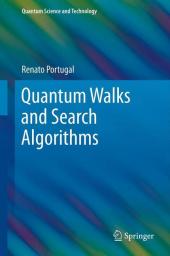 Neuerscheinungen 2015Stand: 2020-02-01 |
Schnellsuche
ISBN/Stichwort/Autor
|
Herderstraße 10
10625 Berlin
Tel.: 030 315 714 16
Fax 030 315 714 14
info@buchspektrum.de |

Renato Portugal
Quantum Walks and Search Algorithms
2013. 2015. xi, 222 S. 37 SW-Abb., 4 Tabellen. 235 mm
Verlag/Jahr: SPRINGER, BERLIN; SPRINGER NEW YORK; SPRINGER 2015
ISBN: 1-489-98802-5 (1489988025)
Neue ISBN: 978-1-489-98802-7 (9781489988027)
Preis und Lieferzeit: Bitte klicken
This book explores quantum walks, which are important in building quantum algorithms. Coverage includes Grover´s algorithm; Analytical solutions of quantum walks using Fourier transforms; Quantum walks on generic graphs; Spatial search algorithms and more.
This book addresses an interesting area of quantum computation called quantum walks, which play an important role in building quantum algorithms, in particular search algorithms. Quantum walks are the quantum analogue of classical random walks.
It is known that quantum computers have great power for searching unsorted databases. This power extends to many kinds of searches, particularly to the problem of finding a specific location in a spatial layout, which can be modeled by a graph. The goal is to find a specific node knowing that the particle uses the edges to jump from one node to the next.
This book is self-contained with main topics that include:
Grover´s algorithm, describing its geometrical interpretation and evolution by means of the spectral decomposition of the evolution operator
Analytical solutions of quantum walks on important graphs like line, cycles, two-dimensional lattices, and hypercubes using Fourier transforms
Quantum walks on generic graphs, describing methods to calculate the limiting distribution and mixing time
Spatial search algorithms, with emphasis on the abstract search algorithm (the two-dimensional lattice is used as an example)
Szedgedy´s quantum-walk model and a natural definition of quantum hitting time (the complete graph is used as an example)
The reader will benefit from the pedagogical aspects of the book, learning faster and with more ease than would be possible from the primary research literature. Exercises and references further deepen the reader´s understanding, and guidelines for the use of computer programs to simulate the evolution of quantum walks are also provided.
Introduction.- The Postulates of Quantum Mechanics.- Introduction to Quantum Walks.- Grover´s Algorithm and its Generalization.- Quantum Walks on Infinite Graphs.- Quantum Walks on Finite Graphs.- Limiting Distribution and Mixing Time.- Spatial Algorithms.- Hitting Time.- Appendix: Linear Algebra for Quantum Computation.
From the reviews:
"The reviewed book is a pedagogically oriented survey of the main results regarding quantum walks and quantum search algorithms. ... The book is nicely written, the concepts are introduced naturally, and many meaningful connections between them are highlighted. The author proposes a series of exercises that help the reader get some working experience with the presented concepts, facilitating a better understanding. Each chapter ends with a discussion of further references, pointing the reader to major results on the topics presented in the respective chapter." (Florin Manea, zbMATH, Vol. 1275, 2014)


